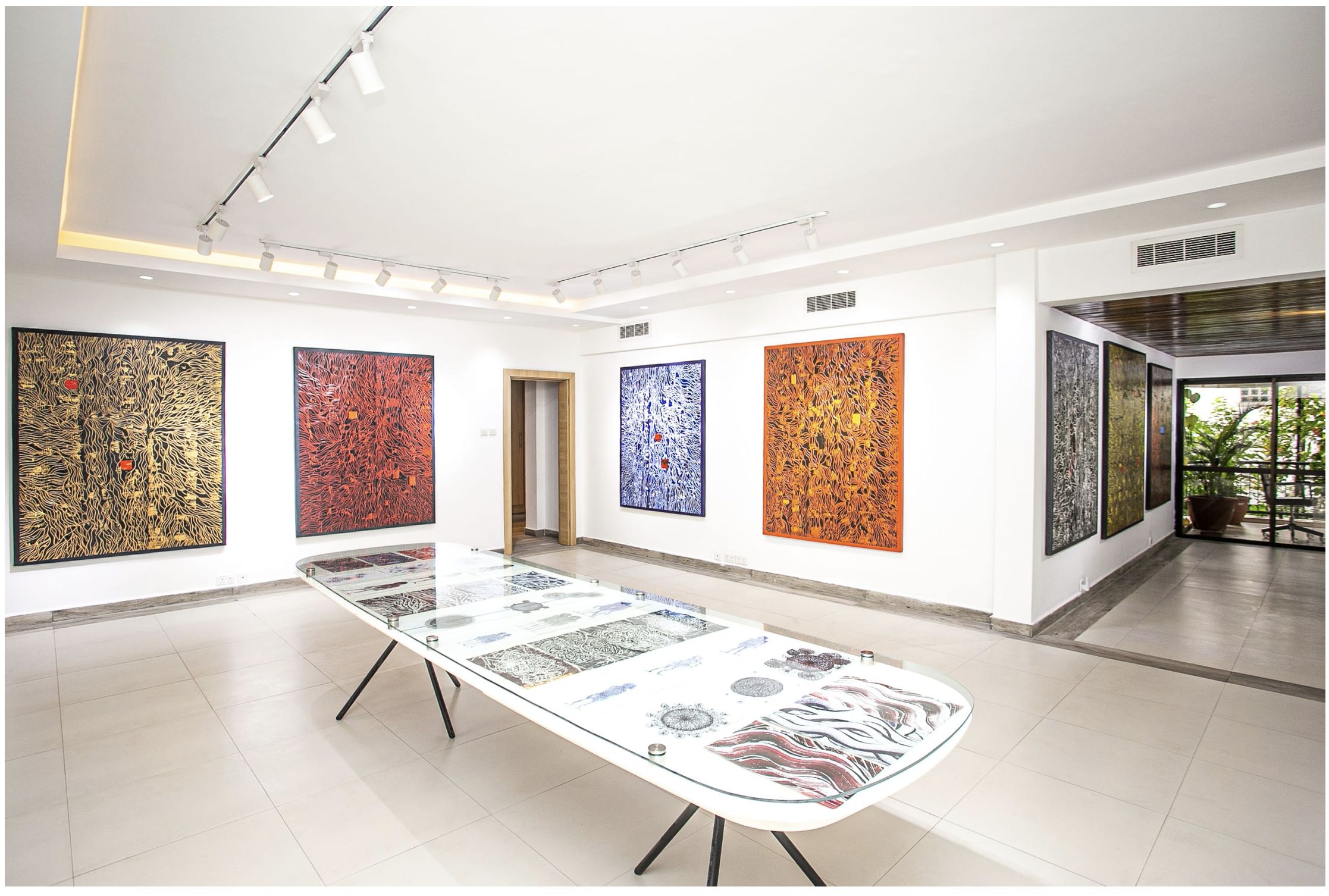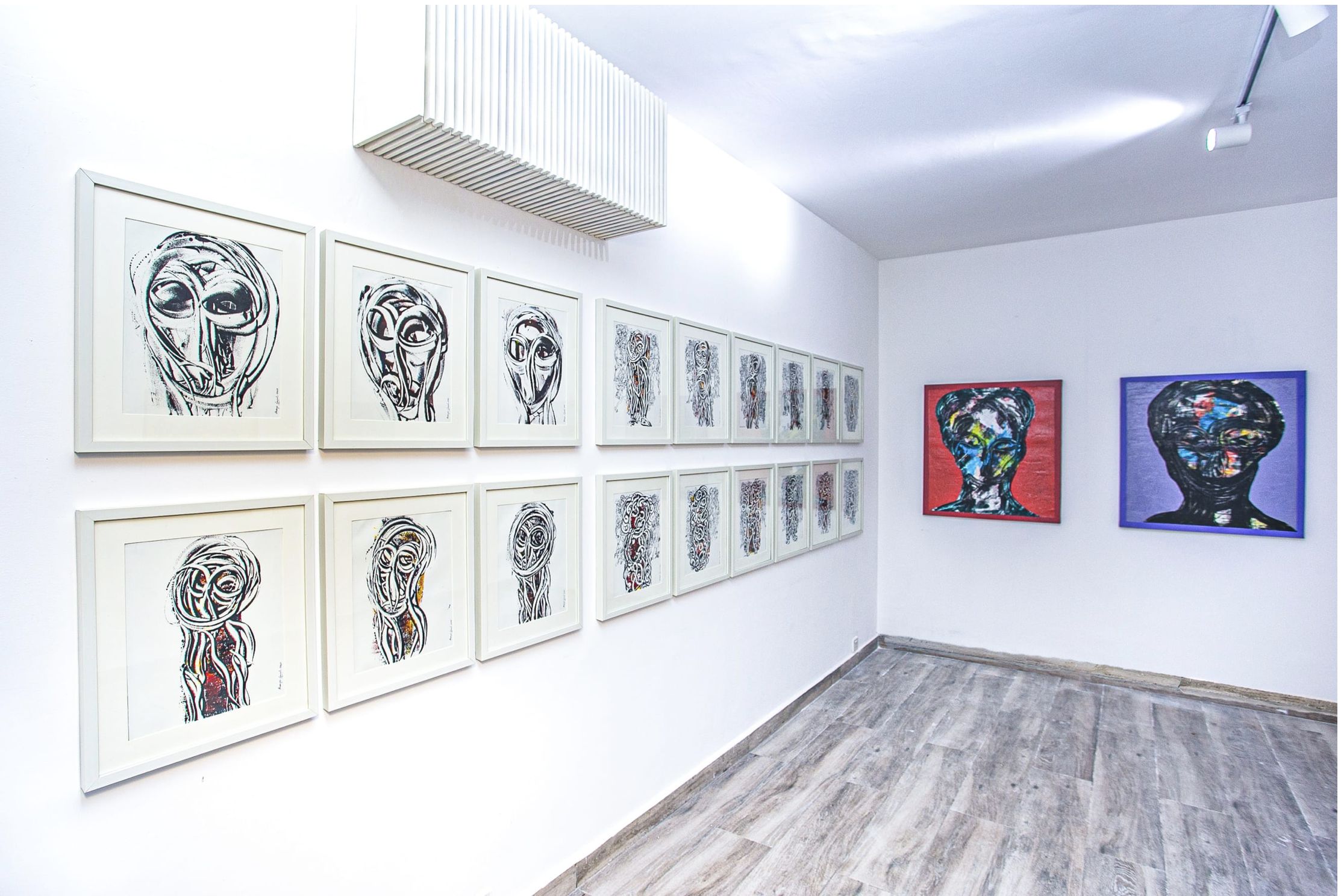Busayo Lawal: Life in Asymmetry
7th – 26 August 2021
kó Gallery
Lagos, Nigeria

Busayo Lawal makes some of his most riveting works on paper. Only a fraction of the current total of 10,000 works in pencil and ink are on show in Life in Asymmetry, the majority of which date from 2008 until today. Some are automatic drawings while others are predetermined compositions, typically the product of concerted effort but seldom as a distraction from other demanding activities.
Drawing frequently on sheets of paper as well as sketchpads, Lawal has perfected his use of continuous lines to coax shape and movement in his exploration of psychic and physical states. In these works, standing figures with differing gestures suggest protest, resignation and idleness inspired by people from all walks of life. Other works examine the natural laws of balance and harmony, as well as the manipulations of mechanical systems like the wheel axis. Dense and webbed circular structures — often with smaller ones orbiting around them — take the form of graphical reflections on weight, mass and energy. Lawal’s lifelong obsession with the abstracted patterns on aso oke has engineered a recognisable visual signature — if “style’’ is too frivolous a word — but the meanings and interpretations differ from one work to another. The slim, flowing and densely packed lines in bold, opaque colours over jet-black underpaint could denote the mindless pursuit of wealth in one work. In a different work, a similar composition joyfully celebrates the ordinary and undistinguished.
Timeless Rush (2021) is a sweeping critique of the immense wealth and immense inequality created by the Portugese-led gold rush in West Africa between the 15th and 17th centuries. The Monumental Man (2020) is a tribute to the working class and those at the lower rungs of societal order who go through life uncelebrated. Emerging Man (2020) posits humankind is perpetually evolving into a better being. The implication is that we are forever in what the Yorubas call “oju dudu”, an age of ignorance that is continuously negotiated by new discoveries.
The message is the aim rather than any selfish (or selfless) artistic goal to create abstraction for its own sake. Lawal insists that these works are not hybrid forms of figuration and abstraction even when a figure can be made out. “I employ abstract concepts in my work from conception to the finished piece” says the artist, “but I push the boundaries of my paintings by employing distorted human characters or distorted human form or caricatures.” These “distorted” figures signify the imperfections and limitations of humans. For Lawal the process is clear and simple. He employs form, texture, line, pattern and composition in order to create an engaged visual experience and abstraction is his preferred method. One key series in Life in Asymmetry is titled Portrait of Mr Say Something (2020), a set of eight paintings in equal sizes (75 x 68 cm) and whose en face figures differ slightly in posture but
widley in colour compositions. Each figure has a dense compaction that resembles dreadlocks which dominate the negative space on either side
of the figure’s face. In place of the anatomy of the face is Lawal’s signature combination of geometry and colour; square and rectangular blocks with
competing intensity which are webbed over with thick sinuous lines.
One of Lawal’s intentions for the series is to encapsulate the idea of irrepressive truth and the brave who speak it out even to their detriment. “I see this on a daily basis in my homeland and many times it’s usually painful and saddens the meekest of hearts” says the artist. “I see the face in the work momentarily in a state of flux in between the path to the truth and the opposite side.” The lavishly painted hair on the figures are loaded with the socio-political overlay of beauty and racial pride, amongst others. For Lawal, the hair is a crown and therefore carries allusions of attraction and power: “These elements are used interchangeably either to create, nurture or manipulate”. This is also true of Lawal’s visual signature which is used to reimagine a wide range of thematic concerns. The two components “signature” and “themes” are subject to continuous, independent investigations and discoveries. As well as the finished works, Lawal’s chosen materials carry weighty significance of their own. The lithographic paint or printer’s ink represents the printing press throughout the history of mass communication, while the graphite with which he draws is a stand-in for erased or undocumented histories and knowledge on the continent. From global trade circuits to the evolution of thought to egalitarian concerns, Lawal’s high minded thematic range is rendered through a well-refined process and visual signature.
